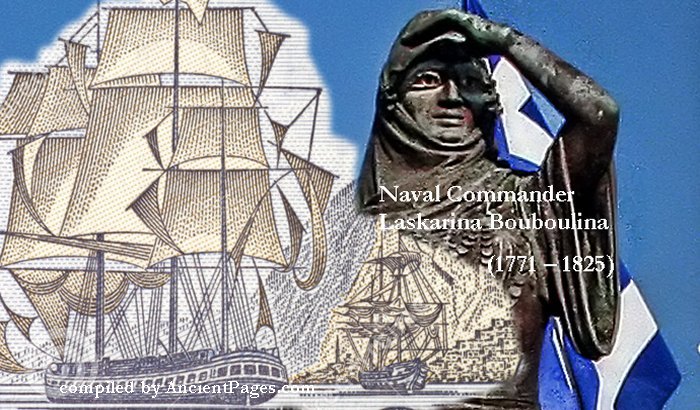Bouboulina: Heroine, Wealthy Widow And Shipowner Who Commanded A Greek Fleet Against The Ottoman Empire
A. Sutherland - AncientPages.com - A wealthy and brave shipowner, Laskarina "Bouboulina" Pinotsis (1771–1825) was a fleet commander who participated in the War of Greek Independence against the Ottoman Empire.
Bouboulina (sometimes spelled Boubalina Lascarina) was the daughter of a Greek ship's captain Stavrianos Pinotsis, from the island of Hydra, and his wife, Skevo.
She was born in prison in Constantinople (modern Istanbul) when her mother visited a dying husband there, held for participating in a failed rebellion 1769-1770 in the Peloponnese.
Stavrianos died soon after, and her mother, Skevo, took her child home to Hydra. Four years later, they moved to the island of Spetses, and Bouboulina's mother married a sea captain. The young girl grew up with hatred against the Ottomans and an interest in ships and the sea. Her stepfather also encouraged her to learn as much as possible about boats and the family business.
During her lifetime, she had two husbands, who were sea captains, and both died during encounters with the Algerian pirates who often attacked the coasts of Greece.
Bouboulina Joined The Movement Friendly Society
Left with a large inheritance and nine children, Laskarina could live a comfortable life, but she wanted to do much more. She took over management of both of her husbands' shipping businesses, and after she managed to save her money from confiscation, ordered the construction of a fleet of warships.
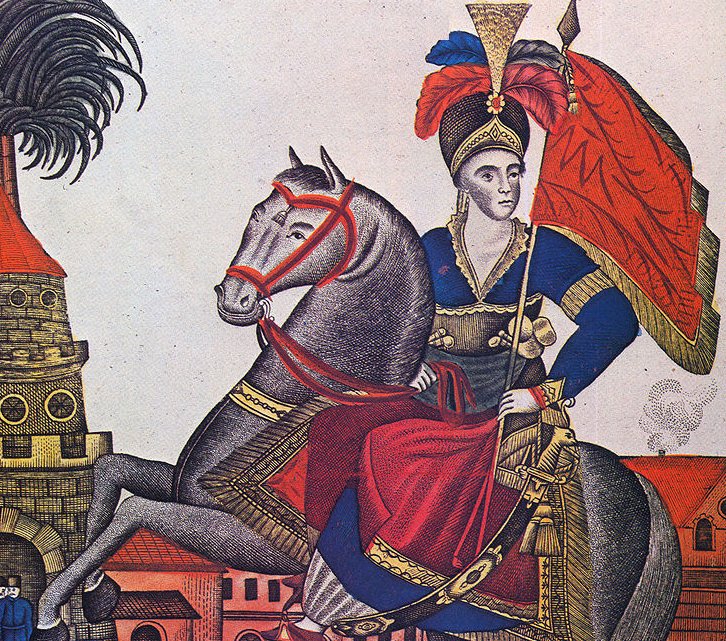 Russian engraving of Laskarina Bouboulina, the heroine of the Greek War of Independence. Source
Russian engraving of Laskarina Bouboulina, the heroine of the Greek War of Independence. Source
In Constantinople in 1818, Bouboulina joined the movement Friendly Society (Filiki Etairia), a secret society dedicated to liberating Greece from Ottoman rule founded by foreign merchants. Hundreds of affluent and educated Greek intellectuals, shipowners, clergy members, landowners, and merchants belonged to this influential underground organization;
Bouboulina was the only female member among them. Strangely, her name does not appear among the 1,093 names on the surviving membership lists of the Filiki Etairia society.
Whether she was an official member of the organization or an unofficial one-woman ladies' auxiliary, she devoted her fleet and her fortune to the independence movement." 1
In 1820, the construction of Agamemnon, a 33-meter-long ship armed with 18 heavy cannons, was completed despite many obstacles from the Turkish authorities. In the meantime, Bouboulina and her people accumulated significant ammunition and weapons, and the movement began to support the rebellion against the Ottoman Empire.
The date of the War of Greek Independence began on March 25, 1821. Bouboulina was ready; she was a fifty-year-old woman and commander of four ships in addition to the 'Agamemnon' and her small private army of 'brave lads' as she called them. They called her 'Kapetanisa' (Lady Captain).
Soon after the war broke out, on her flagship, the Agamemnon, the largest and the most impressive in the Greek fleet at the time, Bobboulina sailed to confront was against the Ottomans.
She blocked the port at Nafplion, a strategic Ottoman stronghold with massive fortifications and three hundred cannons. At the time, Nafplion was considered to be impregnable. Bouboulina showed everyone wrong.
Nineteenth-century Greek historian Anargyros Hatzi-Anargyrou wrote an eyewitness account of her assault on Nafplion:
'On December 4, 1821, as I remember, onboard her vessel, she gave orders for the boats to attack the fort. They immediately sail forward, but a rain of bullets and cannon fire from the coastal fortifications make her brave lads fall back for a moment. Like an angry Amazon, watching the battle over the side of her boat, she then shouts—'Are you women then and not men?' Forward! Her officers obey, regroup and attack—they fight but die in vain since the fort is impregnable by sea. For this reason, she lands with her forces and stays until the fall of the fort on November 30, 1822, leading her men in battle, spending her fortune..." 1
After Nafplion, the brave Bouboulina participated in several other military confrontations against the Ottomans. The most critical incident occurred in September 1821, after the Turkish position at Tripolis fell to besieging Greek forces. The city fell after three days of massacre and looting, which resulted in thirty thousand dead.
Sudden Death Of Brave Commander Bouboulina
She did not die like a brave soldier in one of the ordinary battles for Greek freedom. At the end of 1824, during the war with the Ottomans, a civil war broke out between conflicting factions of rebels over the leadership of the new Greek state.
Not only were the Ottomans Bouboulina's enemy, but she also had one private enemy, and her fiery temper led to her death.
In 1825 as the result of a family feud on the island of Spetses, someone shot at Bouboulina. She was hit in the forehead and died instantly. The killer of this tragic incident was never identified.
She was impoverished at her death; her fortune was already lost in her pursuit of Greek Independence; she lost her sons and her fleet.
She died on May 22, 1825, five years before forming an independent Greek state recognized by the European powers. Greece gave Bouboulina the honorary title of admiral after her death, and the Greek people remember her.
Written by - A. Sutherland - AncientPages.com Senior Staff Writer
Updated on December 5, 2022
Copyright © AncientPages.com All rights reserved. This material may not be published, broadcast, rewritten or redistributed in whole or part without the express written permission of AncientPages.com
Expand for referencesReferences:
1. Toler, Pamela D. Women Warriors
Jones David E. Women Warriors
Platon Alexiades, Target Corinth Canal: 1940-1944
More From Ancient Pages
-
 Urban Resiliency Lie Within Ancient Cities – New Study Suggests
Archaeology | Jul 25, 2023
Urban Resiliency Lie Within Ancient Cities – New Study Suggests
Archaeology | Jul 25, 2023 -
 Surprising Evidence Of 12,000-Year-Old Unknown Advanced Secret Knowledge Held By Elite Individuals – The Connection – Part 2
Featured Stories | Feb 7, 2021
Surprising Evidence Of 12,000-Year-Old Unknown Advanced Secret Knowledge Held By Elite Individuals – The Connection – Part 2
Featured Stories | Feb 7, 2021 -
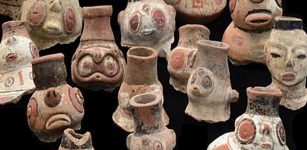 Ancient DNA Tells Story Of Caribbean’s Early Humans
Archaeology | Dec 28, 2020
Ancient DNA Tells Story Of Caribbean’s Early Humans
Archaeology | Dec 28, 2020 -
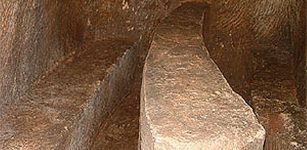 Mystery Of Gilmerton Cove: Underground Maze Of Caves, Passages And Tunnels
Featured Stories | Dec 22, 2015
Mystery Of Gilmerton Cove: Underground Maze Of Caves, Passages And Tunnels
Featured Stories | Dec 22, 2015 -
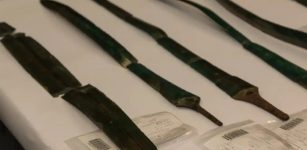 Seven Bronze Age Swords And Large Hoard Of Slavic Coins Found In Germany
Archaeology | Dec 4, 2023
Seven Bronze Age Swords And Large Hoard Of Slavic Coins Found In Germany
Archaeology | Dec 4, 2023 -
 Neanderthals Lived Much Longer In Gipuzkoa Than Previously Thought
Archaeology | Feb 10, 2023
Neanderthals Lived Much Longer In Gipuzkoa Than Previously Thought
Archaeology | Feb 10, 2023 -
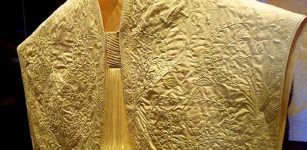 Magnificent Golden Silk Cloth Made By 1 Million Spiders Is One Of The World’s Rarest Silk Textiles
Artifacts | May 20, 2021
Magnificent Golden Silk Cloth Made By 1 Million Spiders Is One Of The World’s Rarest Silk Textiles
Artifacts | May 20, 2021 -
 Gold Dated To Scythian-Saka Era Unearthed In Valley Of The Kings In East Kazakhstan
Archaeology | Sep 14, 2020
Gold Dated To Scythian-Saka Era Unearthed In Valley Of The Kings In East Kazakhstan
Archaeology | Sep 14, 2020 -
 El Gigante Offers Lessons In Sustainability, Evolution And Human Adaptation, Courtesy Of The Holocene
Archaeology | Jun 29, 2023
El Gigante Offers Lessons In Sustainability, Evolution And Human Adaptation, Courtesy Of The Holocene
Archaeology | Jun 29, 2023 -
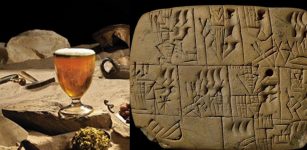 World’s Oldest Paycheck Reveals Ancient Sumerian Workers Were Paid In Beer
Ancient History Facts | Nov 22, 2018
World’s Oldest Paycheck Reveals Ancient Sumerian Workers Were Paid In Beer
Ancient History Facts | Nov 22, 2018 -
 Chinese Invention: World’s First Known Movable Type Printing
Ancient History Facts | Dec 30, 2014
Chinese Invention: World’s First Known Movable Type Printing
Ancient History Facts | Dec 30, 2014 -
 Cyclopean Fortress Of Sacsayhuamán – ‘Impossible’ Ancient Technology In Peru
Featured Stories | Apr 10, 2017
Cyclopean Fortress Of Sacsayhuamán – ‘Impossible’ Ancient Technology In Peru
Featured Stories | Apr 10, 2017 -
 Cursed Dudleytown – What Really Happened In America’s Village Of The Damned In Connecticut
Featured Stories | May 27, 2020
Cursed Dudleytown – What Really Happened In America’s Village Of The Damned In Connecticut
Featured Stories | May 27, 2020 -
 Strange Ancient And Medieval Encounters With Unusual Beings Reported And Documented
Featured Stories | Jan 15, 2024
Strange Ancient And Medieval Encounters With Unusual Beings Reported And Documented
Featured Stories | Jan 15, 2024 -
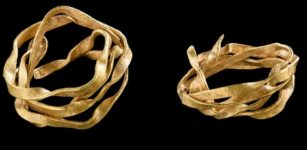 Gold Spiral In Early Bronze Age Grave – Unearthed
Archaeology | Jun 1, 2021
Gold Spiral In Early Bronze Age Grave – Unearthed
Archaeology | Jun 1, 2021 -
 Cryptic Ice Age Markings In European Caves Deciphered – Proto-Writing Discovered By Amateur Archaeologist
Archaeology | Jan 5, 2023
Cryptic Ice Age Markings In European Caves Deciphered – Proto-Writing Discovered By Amateur Archaeologist
Archaeology | Jan 5, 2023 -
 Visit The Palace Where Alexander The Great Was Born In Pella
Archaeology | Oct 21, 2020
Visit The Palace Where Alexander The Great Was Born In Pella
Archaeology | Oct 21, 2020 -
 Controversial Story And Secret Knowledge Of Li Ching-Yuen Who Lived For 256 Years
Featured Stories | Sep 19, 2015
Controversial Story And Secret Knowledge Of Li Ching-Yuen Who Lived For 256 Years
Featured Stories | Sep 19, 2015 -
 The Lost Prophecy Reveals Chilling Future Events – The Last Words To Mankind?
Featured Stories | Jan 24, 2015
The Lost Prophecy Reveals Chilling Future Events – The Last Words To Mankind?
Featured Stories | Jan 24, 2015 -
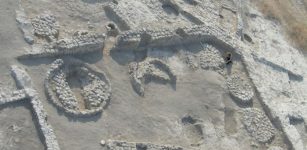 Olive Trees Were First Domesticated 7,000 Years Ago In The Jordan Valley
Archaeology | Jun 17, 2022
Olive Trees Were First Domesticated 7,000 Years Ago In The Jordan Valley
Archaeology | Jun 17, 2022

